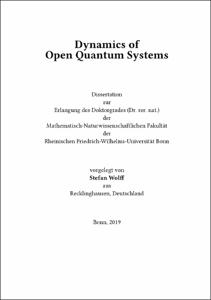Wolff, Stefan: Dynamics of Open Quantum Systems. - Bonn, 2019. - Dissertation, Rheinische Friedrich-Wilhelms-Universität Bonn.
Online-Ausgabe in bonndoc: https://nbn-resolving.org/urn:nbn:de:hbz:5n-54591
Online-Ausgabe in bonndoc: https://nbn-resolving.org/urn:nbn:de:hbz:5n-54591
@phdthesis{handle:20.500.11811/7924,
urn: https://nbn-resolving.org/urn:nbn:de:hbz:5n-54591,
author = {{Stefan Wolff}},
title = {Dynamics of Open Quantum Systems},
school = {Rheinische Friedrich-Wilhelms-Universität Bonn},
year = 2019,
month = jun,
note = {Remarkable experimental progress and theoretical advancements in the study of strongly corre- lated systems have opened up new doors towards a better understanding of interesting states of matter. Such states could possibly be used to develop novel technological applications based on the principles of quantum mechanics. In recent years, the investigation of both complex solid state and ultracold atom systems has lead to a number of fascinating discoveries with regards to their non-equilibrium properties. One route to probe non-equilibrium physics is to consider the evolution of open systems defined by the coupling to an external environment introducing dissipation. Engineering the environment according to predefined requirements can then be used to dynamically prepare states which are difficult to access otherwise.
This thesis explores the dynamics of many-body open quantum systems aiming at under- standing the effects resulting from the interplay of kinetic motion, interactions and dissipation in different physical settings. First, we build upon recent developments concerning the coupling of ultracold atoms to optical resonators which are subject to photon losses. We show how the dissipation can trigger an attractor dynamics towards a topologically non-trivial steady state that is robust against perturbations. The numerically obtained full open system evolution en- ables us to not only characterize in detail the steady state but also to analyze the features of the approaching dynamics. Second, we study the propagation of two-time correlation functions in interacting quantum spin-1/2 chains in contact with an environment causing dephasing. Pro- vided with the numerically exact full time-evolution, we identify an algebraic scaling regime where time-translation invariance breaks down and uncover the emergence of aging dynam- ics. Finally, we study a system of interacting fermionic atoms in a one-dimensional lattice with particle loss at the central site. There we report on the dissipation-induced deceleration of the non-equilibrium dynamics known as the quantum Zeno effect. As in the majority of cases quantum many-body systems are not solvable analytically, another central aspect of this thesis deals with adapting numerical methods based on matrix product state algorithms to investigate open quantum systems dynamics.},
url = {https://hdl.handle.net/20.500.11811/7924}
}
urn: https://nbn-resolving.org/urn:nbn:de:hbz:5n-54591,
author = {{Stefan Wolff}},
title = {Dynamics of Open Quantum Systems},
school = {Rheinische Friedrich-Wilhelms-Universität Bonn},
year = 2019,
month = jun,
note = {Remarkable experimental progress and theoretical advancements in the study of strongly corre- lated systems have opened up new doors towards a better understanding of interesting states of matter. Such states could possibly be used to develop novel technological applications based on the principles of quantum mechanics. In recent years, the investigation of both complex solid state and ultracold atom systems has lead to a number of fascinating discoveries with regards to their non-equilibrium properties. One route to probe non-equilibrium physics is to consider the evolution of open systems defined by the coupling to an external environment introducing dissipation. Engineering the environment according to predefined requirements can then be used to dynamically prepare states which are difficult to access otherwise.
This thesis explores the dynamics of many-body open quantum systems aiming at under- standing the effects resulting from the interplay of kinetic motion, interactions and dissipation in different physical settings. First, we build upon recent developments concerning the coupling of ultracold atoms to optical resonators which are subject to photon losses. We show how the dissipation can trigger an attractor dynamics towards a topologically non-trivial steady state that is robust against perturbations. The numerically obtained full open system evolution en- ables us to not only characterize in detail the steady state but also to analyze the features of the approaching dynamics. Second, we study the propagation of two-time correlation functions in interacting quantum spin-1/2 chains in contact with an environment causing dephasing. Pro- vided with the numerically exact full time-evolution, we identify an algebraic scaling regime where time-translation invariance breaks down and uncover the emergence of aging dynam- ics. Finally, we study a system of interacting fermionic atoms in a one-dimensional lattice with particle loss at the central site. There we report on the dissipation-induced deceleration of the non-equilibrium dynamics known as the quantum Zeno effect. As in the majority of cases quantum many-body systems are not solvable analytically, another central aspect of this thesis deals with adapting numerical methods based on matrix product state algorithms to investigate open quantum systems dynamics.},
url = {https://hdl.handle.net/20.500.11811/7924}
}






